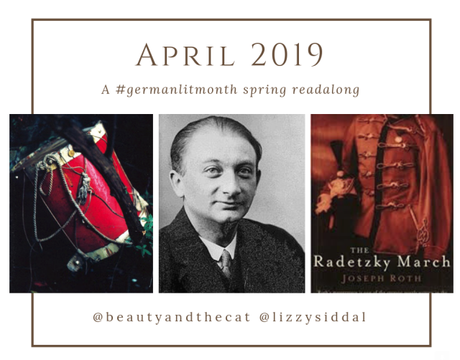
SPOILER WARNING – The answers and questions give away important plot points
Welcome to the #germanlitmonth spring readalong of Joseph Roth’s more famous novel, The Radetzky March. What enticed you to readalong with us?
I’ve read the book ages ago, in school, however, because we started it towards the end of a semester, we never finished it and because we were moving on to other books, I also never finished it for myself. Although more than one book has been spoilt because I read it in the class room, this one wasn’t. I really loved it, just never found the time to get back to it. The longer I waited, the clearer it became, that I couldn’t just read the final chapters but had to start from the beginning.
Which edition/translation are you using and how is it reading?
I’m reading it in the German original. A paperback edition. Unfortunately it is one of those without any introduction or notes. This is decidedly one of those books where notes would have come in handy.
Is the novel living up to your expectations?
It’s in many ways much better than I remembered it. I don’t think I caught how intertwined the themes of death, dying, and the end of an era were. I also didn’t remember how much it focussed on one person and how male-dominated it was.
How would you comment on the first few sentences? Is this an effective opening? “The Trottas were not an old family. Their founder had been ennobled following the battle of Solferino. He was a Slovene. The name of his village – Sipolje – was taken into his title. Fate had singled him out for a particular deed. He subsequently did everything he could to return himself to obscurity.” (Translation: Michael Hofmann)
I found this very typical for its time, but a bit clunky for a contemporary reader. It’s vital information, of course. It also works as foreshadowing of many of the themes, especially the last sentence. It’s just not the kind of beginning that invites you with open arms, so to speak.
Roth subscribed to Chekhov’s view that a writer “should not be a judge of his characters or what they say, but an impartial witness”. That doesn’t mean that we as readers need to be the same! How do you feel about the hero of Solferino’s crusade to return to obscurity? What are the ramifications of this for his descendants?
I got where he was coming from. I didn’t think he ever saw himself as particularly heroic and the way what he did was described in the school book made him seem even more heroic. On the other hand, his behavior is typical of the older Trotta’s. They are such a strict, pedantic, joyless lot. And it seemed like he didn’t feel he was deserving of his title.
Carl Josef von Trotta follows his grandfather into the military. Is his life there honourable and meaningful? Is his fateful relationship with Dr Demant’s wife innocent?
I was wondering while reading these chapters and came to the conclusion that the relationship possibly was innocent. Roth mentions physical contact when it happens but he doesn’t mention it here. I could be wrong, of course, but it would make Demant’s death even more tragic.
Roth may not judge his characters, but his sights are aimed at other targets: the social order and the military code of honour, for instance. How does Roth critique these?
I think the duel and subsequent death of two officers shows very well how Roth felt about the code of honor. The whole story is absurd and so is the outcome. It doesn’t even matter, whether or not Trotta and Demant’s wife were having an affair. One has also the feeling Demant doesn’t even do it because of his pride, but because he thinks he has to. I’ve come across other duels in novels and they are always used as a means to show how cruel the code of honor was. But I don’t think I’ve ever come across one with quite that outcome. The double death makes it even more cruel and absurd.
Do you have any further comments on this section?
What struck me the most in this section was Carl Joseph’s reaction to Mme Slama’s death. It’s almost as if it hit his core and he wasn’t the same from then on. He immediately associated her death with the decay of her body. I suspect, although I have no proof whatsoever, that this is rather how Roth felt about death. The images of worms eating decaying bodies is recurring. Obviously, it also echoes the death of the monarchy. As a reaction of such a young man, it seemed extreme, but her death could also have triggered an underlying depression, which became aparent in these morbid thoughts.
